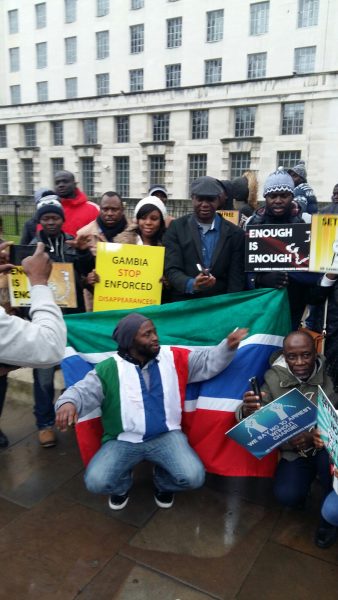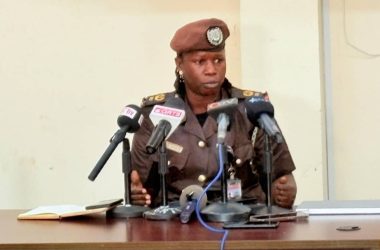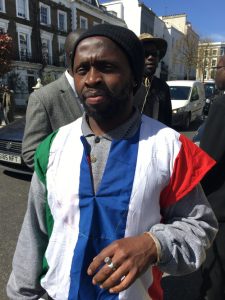
(JollofNews) – Salif Joof looked nervously at his door as he welcomed me into the three bedroom house he shares with his partner. “I am a dead man walking,” he said. The 38-year-old renown Gambian activist is facing deportation to his native country after his asylum application was refused by the British Authorities.
A native of Niumi in the North Bank Region of the Gambia, Joof left his country eight years ago to study logistics in the UK.
And although he was thousands of miles away, he followed events in the country closely and became concerned with what he believed is the wrong direction the Gambia is heading under the leadership of President Yahya Jammeh.
Mr Jammeh, 51, has been ruling the small West African nation of less than two million people since 1994, when the then 29-year-old seized power in a bloodless coup.
He has vowed to remain president ‘as long as God and the people wish’ but his regime is accused by right groups of committing many human rights abuses with impunity including enforced disappearances, arrest and torture of political opponents thereby creating a more restrictive environment for Gambians in the country including journalists and government critics.
To strengthen his grip on power, Mr Jammeh runs one of the most feared intelligence agencies in Africa, with its tentacles spread across the country – so much so that people in cities and villages fear speaking ill of the man.
Not happy with the status quo, Joof decided speak out against the ills of the Gambian regime especially the execution of nine death row inmates in August 2013. And with the support of other Gambians in the UK, he set up the UK Gambians for Peace and Justice in partnership with other concerned Gambians with the aim of being a ‘voice of the voiceless’ and
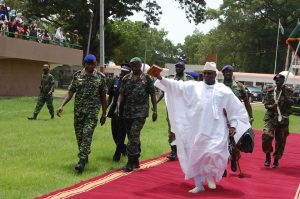
highlight the ‘dictatorship’ and human rights violations in the Gambia.
The group held many anti-regime protests outside the House of Commons, 10 Downing Streets, Gambian High Commission and Nigerian High Commission and demanded both the British and Nigerian governments to put pressure on the Gambian regime to respect the rights and freedoms of Gambians.
While out on the streets, Joof and his fellow protesters would often be filmed and photographed by agents of the regime in the UK who send their video footages and photos to the authorities back home. And as the movement began to gain momentum and international publicity, the Gambian regime passed a law which criminalise all forms of anti-Jammeh protest both in the Gambia and in the diaspora.
Under the new law, any Gambian living in the Gambia or diaspora convicted of protesting against the regime or using the internet to spread false news or make derogatory statements, incite dissatisfaction, or instigate violence against the government or public officials faces a 15-year jail term and fine of 3 million Dalasis (about US$100,000).
The law also targets Gambians who seek asylum in foreign countries.
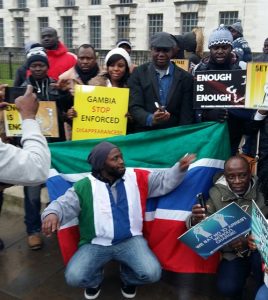 According to former Information Minister Nana Grey Johnson, the law was passed to prevent Gambians from engaging in “unpatriotic behavior” against the government and public officials.
According to former Information Minister Nana Grey Johnson, the law was passed to prevent Gambians from engaging in “unpatriotic behavior” against the government and public officials.
Undeterred by the law which he regarded as an unjust law designed to keep Gambians in passive subjugation, Joof continued to speak out against the deteriorating human rights situation. He also used the online Gainako Radio based in the US to reach out to other Gambians in the diaspora and called on the Gambian authorities to end the brutal crackdown on political opponents.
However, the Gambian regime ignored his calls and in April this year, it brutally suppressed a peaceful protest by supporters of the main opposition United Democratic Party (UDP) who were demanding electoral reform and the resignation of President Jammeh. The protesters were arrested and tortured before been handed long jail terms.
One of the protesters, Solo Sandeng, UDP National Organising Secretary, who organised the protest was killed in custody during intense interrogations and the government is yet to release his body. A death certificate report states that he died of dyspnea.
The United Nations, ECOWAS, African Commission on Human and Peoples’ Rights, European Union, and United States have called on the Gambian government to conduct an impartial, independent and transparent investigation into Sandeng’s death, but thus far, no investigation has commenced.
But in response to these appeals, the Gambian president said, “People die in custody or during interrogations, it’s really common. This time, there is only one dead and they want investigations? No one can tell me what to do in my country.”
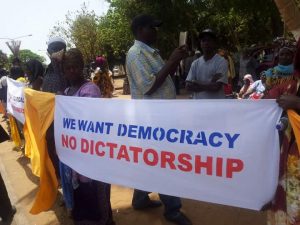
Joof is worried that a similar fate awaits him and other anti-regime protesters in the diaspora. And despite, his well documented activism and the Gambia government’s much publicised persecution, torture, and killing of its critics, the British government has asked Joof to leave Britain voluntarily or face forceful removal on the grounds that there is little to suggest that he will be harmed or persecuted when he returns home.
“Look at this,” he said handing me a newspaper printout containing the harrowing testimony of Nogoi Njie, a UDP supporter, who was severely tortured and sexually assaulted at the National Intelligence Agency’s head office in Banjul after she was arrested in April for taking part in an unauthorised anti-regime protest.
“I will be subjected to worse treatment than this. The officers of the feared National Intelligence Agency will be waiting for me at the airport and I will be arrested as soon as I set my foot in Banjul,” he said.
“This regime has no respect to the rights of Gambians and it would torture and kill me as a warning to other anti-regime protesters in the diaspora.
“I want Gambians to live in peace and have the same freedoms we take for granted in this country and other parts of the world. But Gambians will never enjoy democratic freedom and liberty unless we take a stand.”
Joof is among several failed Gambian asylum seekers facing the threat of removal from the UK and the Gambian civil society associations and right groups have expressed concern at the UK’s treatment of Gambian activists and journalists seeking asylum in the UK.
But a UK Border Agency spokesman said: “We do not comment on individual cases but we only ever return those whom the UKBA are satisfied do not need our protection and refuse to leave voluntarily.”
Joof’s fears were confirmed in June by Amnesty International in its annual report on Gambia. 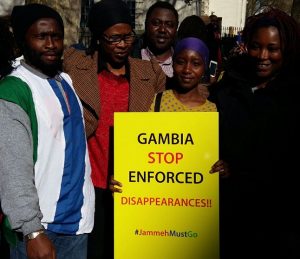
In its report titled Dangerous to Dissent: Human Rights Under Threat in Gambia, Amnesty International highlights the repressive tactics employed by the Gambian government to suppress all forms of opposition to President Yahya Jammeh’s rule.
“Gambia has a long and brutal history of repression of critical voices, and demonstrators such as Solo Sandeng have paid a high price for peaceful protest,” said Alioune Tine, Amnesty International Regional Director for West and Central Africa.
The Jammeh government frequently uses the Public Order Act to prohibit demonstrations and opposition party gatherings. But since the presidential elections in 2011, new laws have been instituted that further restrict political rights. Three media outlets have been closed since then and dozens of journalists have fled the country due to persecution.
According to the report, Gambian authorities practice surveillance that instills fear and intimidation in the populace.
“You don’t feel safe anywhere, even in your home. You don’t trust even your maids or drivers. You can pay someone US$10 and they will give information. In public spaces you don’t speak about sensitive things,” an activist told Amnesty International.

